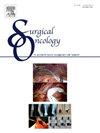The genomic analysis of patients with musculoskeletal metastases from an unknown origin
IF 2.4
4区 医学
Q3 ONCOLOGY
引用次数: 0
Abstract
Background
A subgroup of patients present with musculoskeletal (MSK) metastases but no detectable primary tumour. An inability to employ disease-specific treatment means this cohort's median survival is just 6–10 months. We present a novel, prospective, pilot study investigating the role of targeted Next Generation Sequencing (NGS) of metastases in these ‘Cancer of Unknown Primary’ (CUP) patients, reporting on diagnostic, therapeutic and prognostic benefits.
Materials and methods
Patients with an MSK lesion radiologically consistent with a metastases, no previous cancer diagnosis, and no discernible primary tumour were analysed. After biopsy ruled out sarcoma, patients’ tumoural DNA and RNA was analysed using targeted NGS. Data was processed using a custom bioinformatics pipeline and variants classified by biological and clinical significance.
Results
19 patients (8F:11M, median age 70 years, range 40–76) were analysed. 18 (95 %) had ≥1 variant with ‘potential’ or ‘strong’ clinical significance. 8 (42 %) patients' variants highlighted them as eligible for an open clinical trial(s). 3 (16 %) had variant(s) with potential therapeutic or prognostic ramifications. Median cohort survival was 15 months (0–41). 5 of the 11 (45 %) patients referred to an appropriate MDT based on their genomic analysis died during follow up (median survival 11 months, 4–32), compared to 7/8 (88 %) managed by a CUP MDT (median survival 9 months, 0–18).
Conclusion
Our data suggests the real-time genomic analysis of CUP patients has multiple diagnostic and therapeutic benefits. Larger, prospective trials are needed to characterise the genomics of this vulnerable patient cohort, looking for survival benefits of this analysis.
来源不明的肌肉骨骼转移患者的基因组分析
一个亚组患者表现为肌肉骨骼(MSK)转移,但未检测到原发肿瘤。无法采用疾病特异性治疗意味着该队列的中位生存期仅为6-10个月。我们提出了一项新的前瞻性试点研究,调查了靶向下一代测序(NGS)在这些“未知原发癌”(CUP)患者转移中的作用,报告了诊断、治疗和预后方面的益处。材料和方法分析了放射学上与转移相一致的MSK病变,既往无癌症诊断,无可识别的原发肿瘤的患者。活检排除肉瘤后,使用靶向NGS分析患者的肿瘤DNA和RNA。数据使用定制的生物信息学管道和根据生物学和临床意义分类的变异进行处理。结果本组共19例患者(8F:11M,中位年龄70岁,范围40 ~ 76岁)。18例(95%)有≥1个具有“潜在”或“强烈”临床意义的变异。8例(42%)患者的变异突出表明他们符合开放临床试验的条件。3例(16%)有具有潜在治疗或预后影响的变异。中位队列生存期为15个月(0-41)。11例患者中有5例(45%)在随访期间死亡(中位生存期为11个月,4-32个月),而采用CUP MDT的患者中有7例(88%)死亡(中位生存期为9个月,0-18个月)。结论对CUP患者进行实时基因组分析具有多种诊断和治疗价值。需要更大规模的前瞻性试验来表征这一脆弱患者群体的基因组学特征,并寻找该分析的生存益处。
本文章由计算机程序翻译,如有差异,请以英文原文为准。
求助全文
约1分钟内获得全文
求助全文
来源期刊

Surgical Oncology-Oxford
医学-外科
CiteScore
4.50
自引率
0.00%
发文量
169
审稿时长
38 days
期刊介绍:
Surgical Oncology is a peer reviewed journal publishing review articles that contribute to the advancement of knowledge in surgical oncology and related fields of interest. Articles represent a spectrum of current technology in oncology research as well as those concerning clinical trials, surgical technique, methods of investigation and patient evaluation. Surgical Oncology publishes comprehensive Reviews that examine individual topics in considerable detail, in addition to editorials and commentaries which focus on selected papers. The journal also publishes special issues which explore topics of interest to surgical oncologists in great detail - outlining recent advancements and providing readers with the most up to date information.
 求助内容:
求助内容: 应助结果提醒方式:
应助结果提醒方式:


